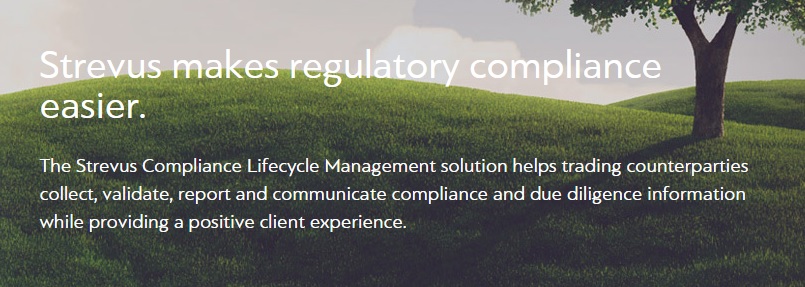Ken Hoang is the Chief Executive Officer at Strevus — a provider of compliance lifecycle management solutions for financial services and digital currency firms.
As Bitcoin becomes more mainstream, so does the need for global compliance, explains Hoang.
Cointelegraph got in touch with the Strevus CEO to discuss some of the most important and pressing issues for cryptocurrencies amid a spotty and ever-changing regulatory landscape. From

Cointelegraph: First, could you tell us a little bit about your background with relation to cryptocurrencies and about your company, Strevus, and what it does?
Ken Hoang: At my last company, Siperian, I saw firsthand just how difficult it was for organizations to achieve the level of data accuracy needed to remain in compliance. In fact, most financial services organizations attempted to handle these challenges internally.
After the 2008 financial meltdown, the world changed significantly in terms of financial regulatory compliance. With Strevus, we saw a great opportunity to combine new technology approaches with our proven data expertise and have set out to address a need in the market that wasn’t previously available.
Strevus was built on the vision that regulatory compliance should be easier, less costly and not disruptive to clients. Strevus’s compliance lifecycle management solution helps digital currency exchanges handle the strict anti-money-laundering safeguards and consumer protections spelled out in a variety of proposed licensing regulations.
The company’s technology enables organizations to easily manage the onboarding process, collect information for Know Your Customer (KYC) and Anti-Money Laundering (AML) reporting, and monitor and analyze the data required to ensure ongoing compliance.
CT: You mentioned that it is becoming increasingly costly for all types of businesses to be compliant with new regulations, some of which overlap. What are the advantages of using a service like Strevus, in comparison to the traditional approach?
KH: The Strevus Compliance Lifecycle Management solution helps financial institutions facilitate communication, validation and reporting of regulatory compliance information between clients, counterparties and regulators. Strevus helps organizations on both sides of the compliance equation—those that need to gather information and those that need to disclose it—all within a single solution.
As a securely hosted solution, Strevus extends and integrates with existing infrastructure investments to create a persistent, collaborative, and auditable communication channel between counterparties, and a central repository to manage and track critical information assets.
By using Strevus, organizations can streamline their client due diligence and collection process to ensure fast and predictable compliance—all while gaining complete transparency and control of compliance information.
CT: With regulatory compliance laws varying across states and nations, how do you ensure that your clients are fully compliant across the board?
KH: By providing enterprise-quality regulatory coverage, scalability and security, Strevus enables organizations that currently trade, or plan to trade, in Bitcoin or digital currency the ability to maintain full compliance with existing KYC, AML, and Patriot Act requirements.
The solution provides a convenient and user-friendly mechanism to share compliance information and notify the relevant counterparties about any important change in their compliance status.
Built on a flexible and extensible platform, Strevus easily integrates to existing exchanges and institutions, and is future-proof against new and changing regulations.
“To gain any real momentum and stability, digital currency requires both the buy-in and adoption from large financial institutions.”

CT: Could you speak a little on the problems with the current state of client due diligence?
KH: To gain any real momentum and stability, digital currency requires both the buy-in and adoption from large financial institutions. Understandably so, global institutions are gun-shy on digital currencies given their high volatility and the absence of any standardized regulation.
It is anticipated that the volatility will be diminished by an influx of institutional dollars in the market. However, the major hurdle for this happening lies in the instability and uncertainty surrounding the regulatory environment governing digital currencies.
Currently, proposed regulations surrounding digital currency are still fluid and there is discord between regulators and market participants on what is fair and reasonable.
Digital currency is no longer relegated to the underbelly of the Internet. Over the course of 2013, major Bitcoin exchanges were trading 1 bitcoin for US$1,000. In mid-December, the value of Bitcoin fell dramatically after news that the cryptocurrency could not be used in
The upcoming listing of COIN, a Bitcoin Exchange-Traded Fund (ETF), on the NASDAQ validates the growing acceptance of Bitcoin and these new types of ETFs, as many view this as an indication that cryptocurrencies are not just another passing tech fad.
CT: You already commented on the BitLicense back in September, but with the recent updates proposed by Ben Lawsky to issue temporary licenses to startups so they can develop, do you think we’re headed in the right direction?
KH: The short answer is yes, we believe issuing temporary licenses is a step in the right direction.
At the recent Money 20/20 conference, New York Department of Financial Services (NYDFS) Superintendent Ben Lawsky said, “One issue that we heard about consistently throughout the entire comment period is a concern about the compliance costs of regulation on new or fledgling virtual currency enterprises. … There has to be a way for startups to start up and play by the rules without getting crushed by huge compliance costs.”
We agree and recommend promoting safe harbor as a transitional mechanism for BTC startups. As you mentioned, we recently filed a comment with the New York Department of Financial Services in response to their request for public comment on their proposed BitLicense, which aims to regulate virtual currency businesses in the state of
We suggested that, to promote innovation in the digital currency ecosystem and ensure a continued, vibrant New York-based digital currency community, DFS should consider implementation of well-established regulatory tools such as minimum thresholds, transition periods and safe harbors.
“The BitLicense proposal has historic importance, as it represents the first significant attempt at rulemaking around digital currency.”
CT: How do you think the NY BitLicense can be improved? Do you think current regulatory ethos will change with Ben Lawsky expected to leave by 2015?
KH: The BitLicense proposal has historic importance, as it represents the first significant attempt at rulemaking around digital currency. We applaud DFS for taking a leadership role here, and we appreciate their stated objective to “balance both allowing new technologies to flourish, while also working to ensure that consumers and our country’s national security remain protected.”
In our view, these twin objectives can be achieved if DFS takes care to implement regulations that are no more burdensome than New York’s Money Transmitter law, nor the federal AML laws. They should ensure such regulations preserve and protect those unique aspects of digital currency that aren’t susceptible to traditional regulatory efforts and offer an appropriate safe harbor to ensure the continued viability of the digital currency industry.
CT: There have been concerns of companies fleeing abroad to “safe havens,” or to where the regulatory environment is relatively lenient. Do you think we will see these so-called “Bitcoin hubs” springing up in places such as the Isle of Man, Jersey, St. Kitts, Singapore, etc., as companies will try to circumvent compliance costs, and what is your view of this approach?
KH: In a free-market system, all players, including those within the digital currency space, will seek to reduce costs and increase profits. Some participants will be attracted to so-called safe havens, and governments like the Isle of Man are moving aggressively to lure BTC companies to host their businesses in their jurisdictions.
“To ensure trust in the system, regulation is needed. But that regulation must be smart and properly tailored to the unique characteristics presented by Bitcoin.”
CT: Many Bitcoin proponents argue that regulations are not needed because the blockchain is designed to self-regulate, since it incentivizes participants to keep the Bitcoin network free from bad actors, 51% attacks, etc. Do you think there is also an element present here of regulators and governments scrambling to maintain control over the financial system?
KH: To ensure trust in the system, regulation is needed. But that regulation must be smart and properly tailored to the unique characteristics presented by Bitcoin. Governments have a legitimate interest in consumer protection and ensuring Bitcoin doesn't become a popular means to commit money laundering or to finance terrorist activities.
It's in the Bitcoin community's interest to permit them to regulate in a responsible and constrained manner for those purposes. The safety and soundness of the world's financial markets and institutions is, of course, a concern to all regulators and governments. Could there be a bit of overreaction in light of recent financial upheavals perhaps?
CT: What changes do you think we can expect in the regulatory landscape for 2015?
KH: It is no overstatement to say that Bitcoin holds incredible promise to fundamentally change the world—from global financial inclusion, enhanced liberty and dignity, improved privacy protection, to stable money supplies and more.
But it is at a fragile point of development with its long-term viability potentially jeopardized either by too little or too much regulation. Too little, and the industry falls prey to criminals and terrorists; too much, and innovation and growth are stifled.
It is imperative that the BitLicense proposal get this balance right. It’s Bitcoin’s time and the world is watching. However, two areas where we see regulators and law enforcement particularly focused on are consumer protection or fraud, and the prevention of criminal activities, namely anti-terrorist financing (ATF) and anti-money laundering (AML).
In advance of final regulations being laid out, the FBI has been keeping a close eye on activity in the space to identify criminal behavior. Enforcement is already happening, and the onus is on those transacting in Bitcoin and other cryptocurrencies to make sure they aren’t facilitating crime.
After all, the pseudonymous nature of transacting counterparties and lacking regulatory requirements make it difficult for financial institutions to mitigate their exposure to criminal activities, including terrorist financing and money laundering. Because of that, we believe regulators’ biggest concern will continue to be how to regulate the industry responsibly in order to promote innovation and transparency, while also ensuring the ability to monitor and control money laundering and terrorist financing.
Did you enjoy this article? You may also be interested in reading these ones:
